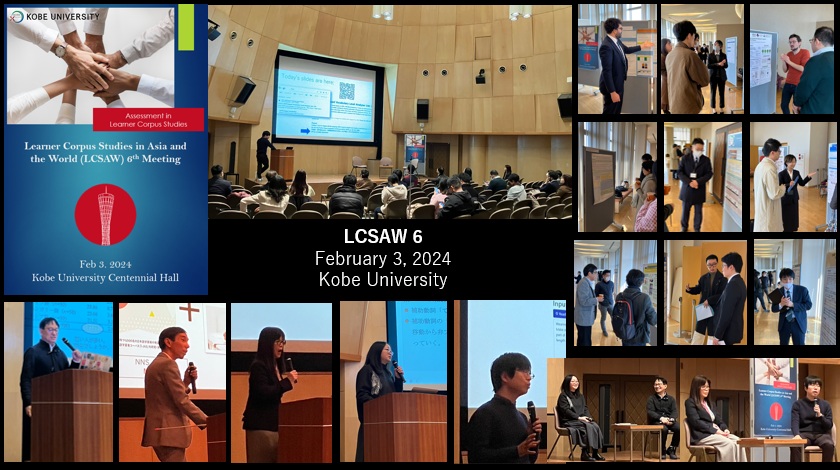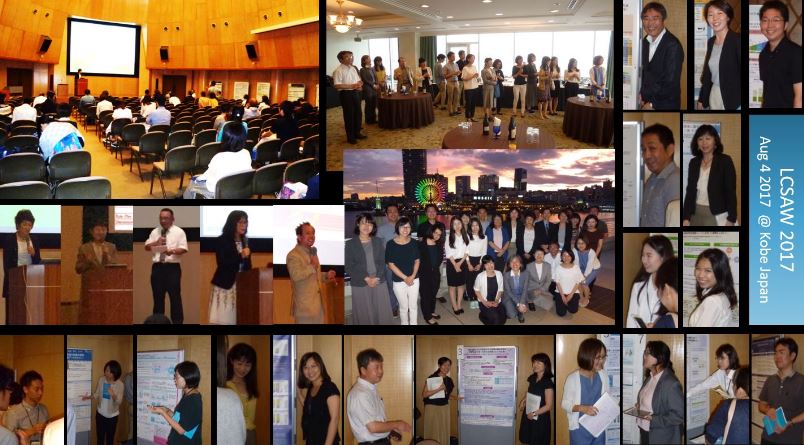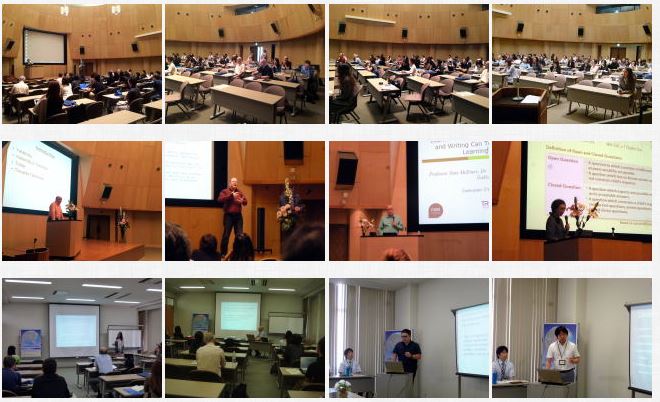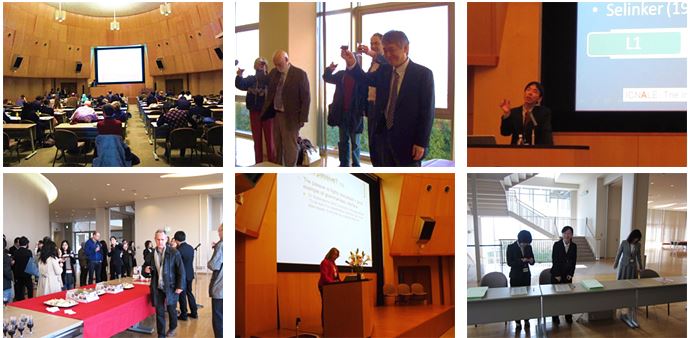ICNALE: The International Corpus Network of Asian Learners of English
A collection of controlled essays and speeches produced by learners of English in 10 countries and areas in Asia
Project Leader: Dr. Shin'ichiro Ishikawa, Kobe University, Japan (iskwshin@gmail.com)
Last updated 2024/5/7
International Learner Corpus Symposium, LCSAW
The ICNALE Team has organized international symposiums, Learner Corpus Studies in Asia and the World (LCSAW) since 2013. Also, we have published peer-reviewed proceedings, Learner Corpus Studies in Asia and the World (ISSN: 2435-2632).

Series Editor
Dr. Shin'ichiro Ishikawa (Kobe University)
Publisher
School of Languages and Communication, Kobe University
Back Numbers
+ Volume 1: Issued on March 23, 2013 (Paper/Online: Includes 17 papers)
+ Volume 2: Issued on May 31, 2014 (Paper/Online: Includes 32 papers)
+ Volume 3: Issued on March 12, 2018 (Paper/Online: Includes 20 papers)
+ Volume 4: Issued on March 17, 2020 (Online: Includes 6 papers)
+ Volume 5: Issued on December 21, 2020 (Online: Includes 10 papers)
+ Volume 6: Issued on March 20, 2024 (Online: Includes 11 papers)
International Learner Corpus Symposium, LCSAW 6 (2024)
LCSAW 6 (2024)
+ Date: February 3, 2024
+Venue: Centennial Hall, Kobe University Travel Guide
+ Presentations: 23 presentations (Incl. 6 Keynote and Invited presentations)
+ Conference Program: Here
+ Publications:Here
+ Presented Papers at LCSAW6 (2024)
(Keynote/Invited)
(E1) Shin Ishikawa (Kobe University) "Recent Developments in the ICNALE Project: Collecting Assessment Data and Expanding Regional Coverage"
(E2) Uchida Satoru (Kyushu University) “Quantitative Insights into ICNALE: Measuring Lexical and Syntactic Features with an Evaluation via ChatGPT”
(E3) Narita Masumi (Tsuda University) "Investigating rater variability in the evaluation of EFL writing performance"
(J1) 石川慎一郎(神戸大学)「日本語L1習得とL2習得の境界をめぐって:I-JASとJASWRICの連動分析の可能性」
(J2) 玉岡賀津雄(名古屋大学名誉教授)「J-CAT(日本語能力)がI-JASストーリーテリングの文章のリーダビリティと述部・名詞句構成に及ぼす影響」
(J3) 蘇鷹(上海大学)「中国人学習者と日本語母語話者による「ていく・てくる」の使用傾向」
(Posters)
(P1) Martin Teshome (Nippon Bunri University) "Make-causatives in Japanese EFL Learner English: A Corpus-based Study"
(P2) Fujiwara Takafumi (Matsumoto University) "A Study on Differences between GPT-generated and ENS-written Essays about a Part-time Job and Smoking in a Restaurant"
(P3) Shie Sato (Waseda University) "Exploring Modal Verb Usage: A Corpus-Based Study of "Can" in the Writings of English L1 Speakers and Japanese L2 Learners"
(P4) Yuka Ishikawa (Nagoya Institute of Technology) "Comparative Study of Self-mention Markers in Academic Text Written by Japanese and non-Japanese"
(P5) 杉浦正利(名古屋大学)・江口朗子(立命館大学)・阿部真理子(岡山大学)・村尾玲美(名古屋大学)・古泉隆(名古屋大学)・阿部大輔(松山大学) 「中学生のスピーキングにおける流暢な産出単位の発達研究」
(P6) 安芝恩(長崎外国語大学・非常勤)「日本語学習者の振り返りコーパス(RCLJ)構築のための基礎研究」
(P7) 福田 翔(富山大学)・張正(東京外国語大学特別研究員)・望月圭子(東京外国語大学) 「日本語・中国語双方向学習者コーパスにおける「存在・所有表現」の第二言語習得」
(P9) 池上彰(広島大学大学院生)・山本健太(国立弓削商船高等専門学校) 「コーパス使用における海事英語のメタファー検証」
(P10) Weiran Wang, Yuming Yang, Wenjuan Qin, Tao Gui (Fudan University, Graduate students) "NLP-Assisted Argumentative Move Analysis"
(P11) Coulange, Sylvain (Grenoble Alpes University, Graduate Student), Konishi, Takayuki (Waseda University), Kato, Tsuneo (Doshisha University), Sugahara, Mariko (Doshisha University), Rossato, Solange (Grenoble Alpes University), & Masperi, Monica (Grenoble Alpes University) "A corpus of spontaneous dialogues in L2 English by French and Japanese L1 speakers for automated assessment of fluency"
(P13) Di Chen (Kobe University, Graduate student) "Problems with the Use of Sino-Japanese Homographs in the Output of Chinese Learners of Japanese: An Investigation Using Diverse Corpus Data"
(P14) Masayuki Iijima (Kobe University, Graduate student) "Adverbs of Certainty (ADC) Used by Japanese Learners of English in ICNALE Written Essays: Comparison with Three Types of Native Speaker Data"
(P15) Lian Zeqi (Kobe University, Graduate student) "The Impact of Proficiency Level Changes on the Use of ABAB-type Onomatopoeia by Japanese Language Learners"
(P16) グエン ザ トーアイ ユー(東京外国語大学大学院生)・望月圭子(東京外国語大学) 「日本語L1ベトナム語学習者コーパスにおけるアスペクトの第二言語習得」
(P17) 劉秋文(東京外国語大学大学院生)・望月圭子(東京外国語大学) 「中国語・日本語双方向対話・作文学習者コーパスの研究」

International Learner Corpus Symposium, LCSAW 5 (2020)
LCSAW 5 (2020)
+ Date: August 21, 2020
+ Venue: On Zoom
+ Invited Speakers: 13 speakers (Incl. 9 Invited speakers)
+ Conference Program: Here
+ Publications:Here
+ Presented Papers at LCSAW5 (2020)
(Keynote/Invited)
(1) IJUIN Ikuko 「作文コーパスの構築から評価研究へ:作文評価の普遍性と多様性を探る」
(2) ISHIKAWA Shinichiro 「習熟度+産出+産出評価=?:学習者コーパス研究の新展開」
(3) KAWAGUCHI Yusaku 「英作文評価と英語ライティングプロセス研究」
(4) KOBAYASHI Yuichiro 「L2ライティングにおけるL1の影響ーメタ談話の観点から」
(5) KOJIMA Masumi 「L2ライティング力の予測変数:これまでどのような研究が行われてきたか」
(6) KONDO Yusuke「学習者言語の評価に関する問題」
(7) LEE Jaeho 「計算モデルは,人の評価にどこまで近づけられるか」
(8) NEKOTA Hidenobu 「高等学校での「話すこと(発表)」の指導の効果測定」
(9) YOKOUCHI Yuichiro 「CAF指標を用いたルーブリックの構成概念妥当性(外的側面)の検証」
(Others)
(10) ADACHI Marie「L2日本語作文の内容に関する評価研究 ―ルーブリック改訂前後の評定・評価理由の比較―」
(11) AZEMOTO Risako 「ICNALEにおける日本人英語学習者のコロケーション産出:母語の影響の観点から」
(12) DENG Qi 「学習段階の変化が日本語学習者の外来語使用に及ぼす影響:「日语学习者书面语语料库」を用いた縦断調査」
(13) PUTRA Jan Wira Gotama「Annotating Argumentative Structure in EFL essays with TIARA」

International Learner Corpus Symposium, LCSAW 4 (2019)
LCSAW 4 (2019)
"ESRC-AHRC UK-Japan SSH Connection Grants Seminar/ LCSAW (Learner Corpus Studies in Asia and the World) 4th Meeting, Kobe Joint Conference 2019"
+ Date: September 29, 2019
+ Venue: Centennial Hall, Kobe University Travel Guide
+ Presentations: 27 presentations (Incl. 13 invited presentations)
+ Conference Program: Here
+ Publications:Here
+ Presented Papers at LCSAW2019
Keynote and Invited Talks
(1) Tony McEnery (Lancaster University) Imagining the next generation of learner corpus
(2) Shin Ishikawa (Kobe University) New perspectives on contrastive interlanguage analysis: An outline of the ICNALE project
(3) Yukio Tono (Tokyo University of Foreign Studies) Developing the L2 Index of Grammar Use: Variability issues revisited
(4) Mariko Abe (Chuo University) Creating a longitudinal corpus of L2 spoken English: Construction process and possible applications
(5) Aaron Olaf Batty (Keio University), Tineke Brunfaut (Lancaster University), and Luke Harding (Lancaster University) The impact of delivery mode on the discourse characteristics of writing task performances
(6) Yasutake Ishii (Seijo University) Assessment of Japanese EFL Learners’ Grammatical Proficiency Levels Based on the CEFR-J Grammar Profile
(7) Emi Izumi (Kyoto University / Kyoto University of Foreign Studies) Learner language modeling from the perspectives of World Englishes and the CEFR
(8) Patrick Rebuschat (Lancaster University and University of Tübingen) The implicit-explicit interface in language learning and teaching
(9) Padraic Monaghan (Lancaster University and University of Amsterdam) Investigating the influence of first on second language learning in the laboratory
(10) Pascual Pérez-Paredes (University of Cambridge) Examining internal validity in learner corpus research: Two case studies
(11)Kazuya Saito (University College, London) Having a good ear predicts successful second language speech acquisition: Collecting, analysing and linking speech and aptitude database in Japan and the UK
(12) Masatoshi Sugiura (Nagoya University) Toward an integrated theory of SLA using tree fragments
(13) John Williams (Cambridge University) The relationship between implicit learning and linguistic insight
Presentations
(14) Aaron Albin, Xinyue Li, Ryoko Hayashi (Kobe University) L1 influence on the prosodic realization of emotion in a second language: Analyses of an L2 Japanese speech corpus
(15) Randy Appel (Waseda University) A contrastive analysis of linking adverbials in L2 English writing: Identifying L1 related differences
(16) Raffaella Bottini (Lancaster University) The effect of age on lexical complexity in the Trinity Lancaster Corpus
(17) Lorrae Fox (Lancaster University) Examiner and candidate collocation use in the Trinity Lancaster Corpus
(18) Yuka Ishikawa (Nagoya Institute of Tech) and Tomiko Komiya (Okazaki Women's Junior College) Possibilities of ESP "Learner" Corpus: Collecting and Analyzing the Abstracts of Engineering Papers Written by Young Researchers
(19) Aika Miura (Rikkyo University) Criterial Pragmalinguistic Features of Requestive Speech Acts Produced by Japanese Learners of English
(20) Kunihiko Miura (The University of Shimane) Developing semantic-based DDL based on comparative study of verb use between British & Japanese students
(21) Atsushi Nakanishi (Kobe University) The Use of Prepositions by Japanese Learners of English: From the Viewpoint of Sophisticated Contrastive Interlanguage Analysis
(22) Masumi Narita (Tokyo International University) Structural Distributions of Antecedents of the Anaphoric Demonstrative “This” in Academic Writing by Japanese and Native English Writers
(23) Laurence Newbery-Payton, and Keiko Mochizuki (Tokyo University of Foreign Studies) L1 Influence on Use of Tense/Aspect by Chinese and Japanese Learners of English
(24) Allan Nicholas, and John Blake (University of Aizu) Annotating Pragmatic Errors in a Japanese Learner Corpus of English Emails
(25) Pilar Valverde (Kansai Gaidai University) CELEN, a corpus of Spanish in Japan for pedagogical purposes
(26) Jingxin Zhang (Kobe University) Use of Japanese Onomatopoeia by Chinese Learners: A Longitudinal Analysis
(27) Xiao Jinlian, Deng Qi, Wang Szuhung, & Maiko Ishida (Kobe Univ Graduate Students) Using learner corpus for studies in foreign language teaching
Previous Conferences
LCSAW 3 (2017)
LCSAW 2 (2014)
LCSAW 1 (2013)
LCSAW 3 (2017)
+ Date: August 4, 2017
+ Venue: Centennial Hall, Kobe University
+ Theme: Collection, Analysis, and Evaluation of L2 Learner Speeches: Interface between English Learner Corpus Studies and Japanese Learner Corpus Studies
+ Conference Language: Japanese
+ Presentations: 20 presentations (Incl. 5 invited presentations)
+ Conference Program: Here
+ Publications: Ishikawa, S. (Ed.). (2018). Learner Corpus Studies in Asia and the World Vol.3. Papers from LCSAW2017. Kobe, Japan: Kobe University. (450 pages).
Here
+ Presented Papers at LCSAW2017
Keynote
(1) Shin'ichiro ISHIKAWA Design of the ICNALE Spoken Dialogue : For Studies of L2 Oral Production in Dialogues
(2) Rie KOIZUMI Recent Studies on Speaking Assessment Using Paired and Group Oral Tasks
(3) Masumi NARITA How We Can Foster Japanese EFL Learners' Writing Proficiency
(4) Chiaki IWAI Practice and Effects of an Intercollegiate Oral Presentation and Performance (OPP) Event : Implications to Develop Learners' English Speaking Ability
(5) Kumiko SAKODA How to build and to use the learners'oral/ written data, in the case of I-JAS? : An investigation of language transfer in I-JAS data, focusing on expressions of request
Presentations
(6) Hiroyuki YAMAUCHI Dialog-type Task in Japanese OPI : Mechanisms to Extract Utterances
(7) Yasutake ISHII An Analysis of Phrasal Verbs Used by Japanese EFL Learners:Based on Spoken Learner Corpora and Authorized English Textbooks
(8) Kunihiko MIURA A Longitudinal, Corpus-Based Analysis of Japanese EFL Learners' Development of English Verb Use
(9) Yuka ISHIKAWA, Tae ITO, Jun ASAI What University Students Think about English Learning: The Influence of Learners' Proficiency, Sex,a nd Major Analysis of Corpus of English Essays on "My English Learning"Written by Engineering Students
(10) Atsushi NAKANISHI An Analysis of Prepositional Phrases in Japanese Learners' Writing in English : Focusing on 3-word Clusters of "in", "on", "at
(11) Ikuko IJUIN, Kazuko KOMORI, Megumi OKUGIRI An Analysis of Raters' Comments on Japanese Opinion Essay
(12) Hui-Wen CHIEN The Usage of Japanese Subsidiary Verb -te simau -in the Utterances of L2 Learners : Compared with Japanese Native Speakers
(13) Hiroaki HATANO An investigation of the linguistic features of B1 level of the JF Standard for Japanese Language Education. : An analysis based on the writing data by Japanese language learners
(14) Noriaki KINOSHITA Acquisition ofl-adjectives by Chinese Learners of Japanese as a Second Language : An Attempt to Construct an Acquisition Model Based on the Longitudinal and the Cross-Sectional Data
(15) Jingxin ZHANG Use of Onomatopoeia by Chinese Learners of Japanese Seen in the International Corpus of Japanese as a Second Language : A Study Based on Comparisons with Korean and English Learners of Japanese as well as Japanese Native Speakers
(16) Deng Qi Use of Katakana Loan-words by Chinese Learners : An Analysis Based on the I-JAS
(17) Wnxin Li The Study of the Collocation Errors Committed by Chinese Learners of Japanese and Their Causes : Perspectives on Image Schema
(18) Shilin Sui A New Japanese Teaching Material for Advanced Japanese Language Learners : Based on Questionnaires to Learners and Comment Survey Result
(19) Xiao Tan The Trials and Analysis of Data Collecting Under the Delayed Utterance Environment : The Use of the Function of Voice Message of WeChat
(20) Hideaki MORI Method of Frequency Comparison According to the Level in Learner Corpus

At LCSAW 2017
Previous Conferences
LCSAW 2 (2014)
LCSAW 1 (2013)
LCSAW 2 (2014)
+ Date: May 31 to June 1, 2014
+ Venue: Centennial Hall, Kobe University
+ Theme: Development of L2 Speech Corpus
+ Conference Language: English
+ Presentations: 32 presentations (Incl. 3 invited presentations)
+ Conference Program: Here
+ Publications: Ishikawa, S. (Ed.). (2014). Learner Corpus Studies in Asia and the World Vol.2. Papers from LCSAW2014. Kobe, Japan: Kobe University. (450 pages).
+ Presented Papers at LCSAW2014
Keynote
(1) Tony MCENERY, Richard XIAO The Development of Corpus Linguistics in English and Chinese Contexts
(2) Andrew HARDIE XML Encoding for Spoken Learner (and Other) Corpora ―A Modest Approach―
(3) Shin’ichiro ISHIKAWA Design of the ICNALE-Spoken: A New Database for Multi-modal Contrastive Interlanguage Analysis
Presentations
(4) Abdullah ALFAIFI, Eric ATWELL, Hedaya IBRAHEEM Arabic Learner Corpus (ALC) v2 ―A New Written and Spoken Corpus of Arabic Learners―
(5) Kornwipa POONPON Designing and Compiling an EFL Spoken Corpus for Assessment and Pedagogical Purposes
(6) Mariko KONDO, Hajime TSUBAKI, Takayuki KONISHI, Yoshinori SAGISAKA Building and Analysis of Asian English Speech Corpus: Japanese Speakers’Phonemic Recognition of English Consonants
(7) Chen-huei WU, Chilin SHIH A Design of the Spontaneous Chinese Learner Speech Corpus
(8) Michael BARLOW Ordering of Elements in Learner Corpora
(9) Hao-jan CHEN Uncovering Collocation Errors by Using Automatic Collocation Extraction and Comparison
(10) Zhao-Ming GAO Automatically Identifying the Syntactic Criterial Features and Error Patterns in the LTTC Learner English Corpus
(11) Yuichiro KOBAYASHI, Mariko ABE A Machine Learning Approach to the Effects of Writing Task Prompts
(12) Wangjie WANG Building a Paraphrase Dataset for Language Learners: Paraphrase Extraction with Document Structure Model
(13) Ying ZHANG, Gaojie PENG Chinese Adverb Processing in Japanese-to-Chinese Machine Translation
(14) Tomoko KANEKO Relationship between Questions and Responses in LINDSEI Japanese Subcorpus Interviews
(15) Sylvain DETEY, Mariko KONDO, Isabelle RACINE, Yuji KAWAGUCHI A Preliminary Investigation of /CC/ Clusters Acquisition by Japanese Learners ofFrench Using Oral Corpora ―Methodological Insights―
(16) Toshihiko UEMURA Is VOICE a Good Role Model for English Users in Japan?
(17) Miharu FUYUNO, Yuko YAMASHITA, Yoshikiyo KAWASE, Yoshitaka NAKAJIMA Analyzing Speech Pauses and Facial Movement Patterns in Multimodal Public Speaking Data of EFL Learners
(18) Yuka ISHIKAWA Gender Differences in the ICNALE-Spoken Baby ― Who Uses Hesitators and Hedges?―
(19) Takumi ISHII Assessing Lexical Diversity Measures in Short Second Language Production ―UsingJapanese EFL Essay Writing in the ICNALE―
(20) Reyhan AĞÇAM Author Stance in Doctoral Dissertations of Native and Non-Native Speakers of English ―A Corpus-Based Study on Epistemic Nouns―
(21) Inna BLYZNA The Use and Misuse of the Aspect Form –teiru by Learners of Japanese as a SecondLanguage
(22) Wararat WHANCHIT Persuasive Features in Reviews Written by EFL Students
(23) Ignace Yuan-peng FAN A Corpus-Driven Study of the Use of Linking Adverbials Between Native Speakers and EFL Learners ―What is Missing?―
(24) M. Pınar BABANOĞLU A Learner Corpus Investigation on the Use of Adverb Types in Academic Vocabulary
(25) Takashi OGATA, Koichi KAWAMURA Asian Learners’ Use of Prepositions and -ly Adverbs ―A Study Based on the ICNALE―
(26) Haixi GONG, Jianguo TIAN A Corpus-based Study on Chinese EFL Learners’ Usage of Preposition from Coselection Theory
(27) Xin CHEN, Jianguo TIAN Study on Collocational Framework of Chinese English Learners from the Perspective of Phraseology
(28) Daisuke ABE A Comparison of Phrase Structures in Learner and Native English Writing
(29) Nozomi MIKI Key Colligation Analysis of 10 Types of Asian Learner English and Two Types of Native English
(30) Simon COLE Japanese Learners and the S-genitive: A Corpus-based Study
(31) Siti Aeisha JOHARRY A Corpus-based Comparative Study on Malaysian Learners’ Writing
(32) Niño SANDIL Re-investigating the Grammatical Features of Philippine English

At LCSAW2014
Previous Conferences
LCSAW 1 (2013)
LCSAW 1 (2013)
+ Date: March 23-24, 2013
+ Venue: Centennial Hall, Kobe University
+ Presentations: 17 presentations (Incl. 5 invited presentations)
+ Conference Program: Here
+ Publications: Ishikawa, S. (Ed.). (2013). Learner Corpus Studies in Asia and the World Vol.1. Papers from LCSAW2013. Kobe, Japan: Kobe University. (300 pages).
+ Presented Papers at LCSAW2013
Keynote
(1) Sylviane GRANGER The Passive in Learner English: Corpus Insights and Implications for Pedagogical Grammar
(2) Andy KIRKPATRICK The Asian Corpus of English: Motivation and Aims
(3) Vincent OOI Lexical Priming and Asian Learners of English
(4) Yukio TONO Exploring the ICNALE ―How to make the most of its design features―
(5) Shin’ichiro ISHIKAWA The ICNALE and Sophisticated Contrastive Interlanguage Analysis of Asian Learners of English
Presentations
(6) Mariko ABE, Yuichiro KOBAYASHI, Masumi NARITA Using Multivariate Statistical Techniques to Analyze the Writing of East Asian
Learners of English
(7) Yuka ISHIKAWA Recurrent Word Clusters Used by Asian Learners―A Statistical Study of Differences―
(8) Satoshi INOUE, Erika MATSUSHITA, Ye CHEN, & Koichi KAWAMURA Clustering of Asian Learners of English―A Study Based on the ICNALE―
(9) Roslina ABDUL AZIZ, Zuraidah MOHD DON The be Verb Omissions among Advance L1-Malay ESL Learners―What Corpus-based Study Can Reveal―
(10) Shazila ABDULLAH, Noorzan Mohd. NOOR Contrastive Analysis of the Use of Lexical Verbs and Verb-noun Collocations in
Two Learner Corpora―WECMEL vs. LOCNESS―
(11) Hiroki HANAMOTO Intelligibility and Acceptability of Collocations from an EIL Perspective ―A Study Based on a Corpus of Speech by Japanese Learners of English ―
(12) Mayumi KAWAMURA, Daisuke YOKOMORI, Masanori SUZUKI, & Yasunari HARADA Data Collection and Annotation of Relatively Spontaneous and Relatively
Extended Elicited Utterances by English Learners in Undergraduate Japanese Courses
(13) Peter John HASSALL Comparative Lexical Frequency Analysis of East Asian and Middle Eastern Corpora: Motivated by the Extremely Short Story Competition [ESSC]
(14) Lan-fen HUANG Pedagogical Implications of the Corpus-based Investigation of Discourse Markers
(15) Rafidah KAMARUDIN A Corpus-based Study on the Use of Phrasal Verbs by Malaysian Learners of English: The Case of Particle up
(16) Custódio MARTINS, Mário PINHARANDA NUNES L2 to L3 Transfer: Learner Corpora Analyses
(17) Naomi MATSUBARA The ESSC as a Tool for Understanding Writers’ Lives and Society―Comparison of Young People in the United Arab Emirates and Japan
by Examining Each Country’s ESSC Stories―

At LCSAW 2013